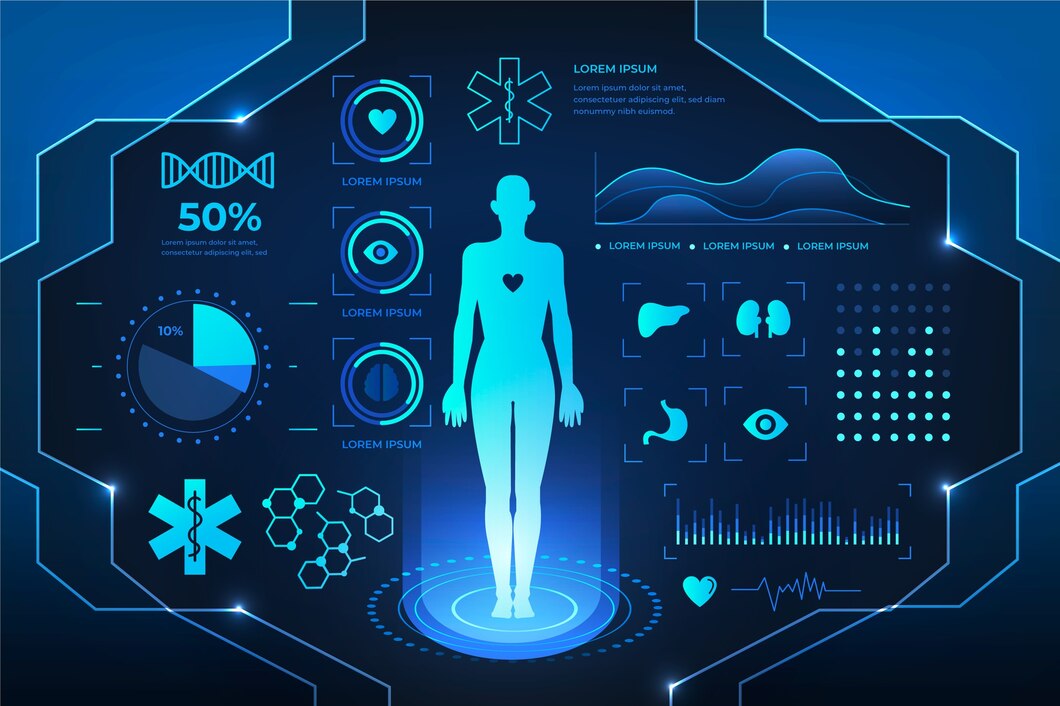Artificial Intelligence (AI) has become a powerful tool in healthcare, revolutionizing how diseases are diagnosed. By leveraging advanced algorithms and vast datasets, AI systems can analyze medical data with unprecedented accuracy and speed. This article delves into the ways AI is impacting diagnostic accuracy, the benefits it brings, and the challenges it faces.
Understanding AI in Diagnostics
1. Machine Learning and Deep Learning:
-
Machine learning (ML) involves training algorithms on large datasets to recognize patterns and make predictions. Deep learning (DL), a subset of ML, uses neural networks with multiple layers to analyze complex data, such as medical images, with high precision.
2. Data Integration:
-
AI systems integrate various types of medical data, including imaging, genomics, and electronic health records (EHRs), to provide comprehensive diagnostic insights. This holistic approach enhances the accuracy of diagnoses and supports personalized medicine.
Applications of AI in Diagnostics
1. Medical Imaging:
-
AI algorithms excel in analyzing medical images, such as X-rays, MRIs, and CT scans. They can detect abnormalities, tumors, and other conditions with greater accuracy and consistency than human radiologists. For example, AI has shown promise in early detection of cancers, reducing false positives and negatives.
2. Pathology:
-
In pathology, AI aids in examining tissue samples and identifying cellular patterns indicative of diseases. AI-powered digital pathology tools enhance the accuracy of diagnoses and enable remote consultations, expanding access to expert analysis.
3. Genomics:
-
AI is crucial in genomics, where it analyzes genetic data to identify mutations and predict disease risk. AI-driven genomic analysis accelerates the identification of genetic disorders and informs targeted therapies.
4. EHR Analysis:
-
AI systems can sift through vast amounts of EHR data to identify patterns and predict disease progression. This helps clinicians make more informed decisions and improves patient outcomes.
Benefits of AI in Diagnostics
1. Improved Accuracy:
-
AI algorithms can process and analyze data with high precision, reducing human error and increasing diagnostic accuracy. This leads to earlier detection and better management of diseases.
2. Efficiency and Speed:
-
AI accelerates the diagnostic process by quickly analyzing large datasets and providing rapid results. This is particularly valuable in emergency settings and for conditions requiring immediate intervention.
3. Consistency:
-
Unlike human clinicians, AI systems do not experience fatigue or variability in performance. This consistency ensures reliable and repeatable diagnostic outcomes.
4. Personalized Medicine:
-
AI enables personalized diagnostics by integrating diverse data sources to tailor treatment plans to individual patients. This approach enhances treatment efficacy and reduces adverse effects.
Challenges and Ethical Considerations
1. Data Quality and Bias:
-
AI systems are only as good as the data they are trained on. Poor-quality or biased data can lead to inaccurate diagnoses and reinforce existing healthcare disparities. Ensuring diverse and representative datasets is crucial.
2. Interpretability:
-
AI algorithms, especially deep learning models, can be complex and difficult to interpret. Clinicians need to understand how AI arrives at its conclusions to trust and effectively use its recommendations.
3. Privacy and Security:
-
The integration of AI in diagnostics involves handling sensitive patient data. Ensuring data privacy and security is paramount to maintain patient trust and comply with regulatory standards.
4. Integration with Clinical Workflow:
-
Seamlessly integrating AI tools into existing clinical workflows is a challenge. Clinicians need training and support to effectively incorporate AI into their diagnostic processes.
Future Implications
1. Continuous Learning:
-
AI systems can continuously learn and improve from new data, enhancing their diagnostic capabilities over time. This adaptability will drive ongoing advancements in diagnostic accuracy and efficiency.
2. Collaborative Diagnostics:
-
AI is poised to complement human expertise, working alongside clinicians to provide collaborative diagnostics. This partnership can enhance clinical decision-making and improve patient outcomes.
3. Global Health Impact:
-
AI has the potential to democratize healthcare by providing high-quality diagnostic tools to underserved regions. This can bridge healthcare gaps and improve global health equity.
AI is revolutionizing diagnostics by enhancing accuracy, efficiency, and consistency in disease detection. While challenges remain, the integration of AI into diagnostic processes holds immense promise for improving patient outcomes and advancing personalized medicine. As AI technology continues to evolve, its impact on diagnostics will only grow, shaping the future of healthcare.




